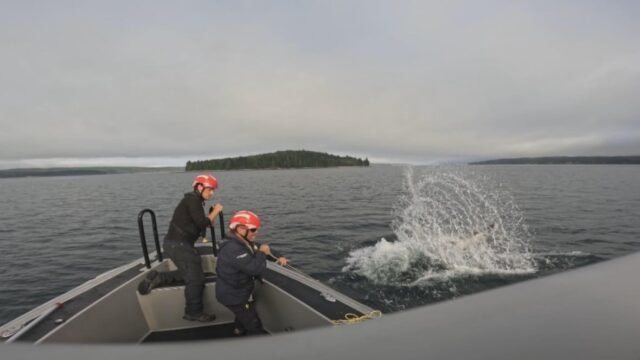A humpback whale is free after being freed off the BC coast by dedicated and persistent rescuers.
The four-and-a-half-year-old whale was spotted entangled in fishing gear on Thursday, Sept. 4, while escorting Coast Guard personnel to a sailboat, said Paul Cottrell, marine mammal coordinator with Fisheries and Oceans Canada (DFO).
Cottrell and his team mobilized by boat from the mainland to the Black Creek area, just north of Comox on Vancouver Island, about 100 kilometers northwest of Vancouver.
With the help of another recreational boater who spotted the cetacean struggling, the Fisheries team and the local marine mammal monitoring nonprofit Strait Watch were able to locate and begin working on the humpback.
But the whale, a male known as Tutu, didn’t make it easy.
“This animal just wouldn’t stop, given its endurance,” Cottrell told CBC’s Coastal Area. “Normally, an animal gets tired over time and you can get close and start taking down the gear pretty quickly, but that wasn’t the case.”
It took the team three days to fully free the whale.
On the first day, Cottrell said he was able to remove about 100 meters of rope from the animal – but there was more work to do, and the whale just kept moving. The rescue team had to call it a night as darkness fell.
The team found the whale again on Friday near Port McNeil, about 165 kilometers northwest of Black Creek, and worked for another nine hours to remove the remaining gear.
“It was just relentless in terms of the action and the level of activity,” Cottrell said. “And you have to do it really slowly and carefully because it’s dangerous. This is a 30-ton animal … it’s full of energy – breaking through, doing crazy behavioral modifications, changes in direction.”
Watch | Humpback released from fishing gear off BC coast:
A multi-day rescue operation by the Department of Fisheries and Oceans and others helped untie a humpback whale dragging more than 100 meters of fishing gear near one of BC’s Gulf Islands.
By Friday evening, they had removed another 30 meters of gear from Tutu, but it was still tangled in two fishing lines. They attached a satellite tag to one of the lines so they could track the whale and easily find it the next morning to finish the job.
But on Saturday morning they discovered that Tutu had freed himself.
“We couldn’t believe it,” Cottrell said. “The animal I think had made a few turns and actually stayed there for 85 or 90 feet.”
While Tutu had some lacerations from the ropes, Cottrell said they were fairly superficial and the whale is expected to go on to live a healthy life.
Tutu is one of several whales that fisheries teams have been sent to separate in recent weeks; Cottrell said there have been four entangled in the humpback in the past couple of weeks.
“It’s definitely been a very, very, very busy year.”
He attributes the frequency of whale rescues to the return of humpbacks to the Salish Sea, after local numbers declined to near extinction due to the commercial whaling industry in the 20th century, according to marine naturalist Tasli Shaw of the area.
“This influx of animals back into these habitats has been tremendous, but we’re seeing more interactions because they’re in these coastal waters,” Cottrell said.
Lara Sloan with the DFO said that “debris is a real problem for marine wildlife.”
She said the public can help prevent gatherings by cutting off wrapping materials, tape, rope and any other loop material before discarding and never using these types of materials in the marine environment.
















